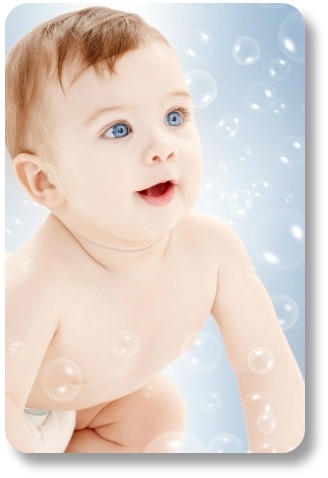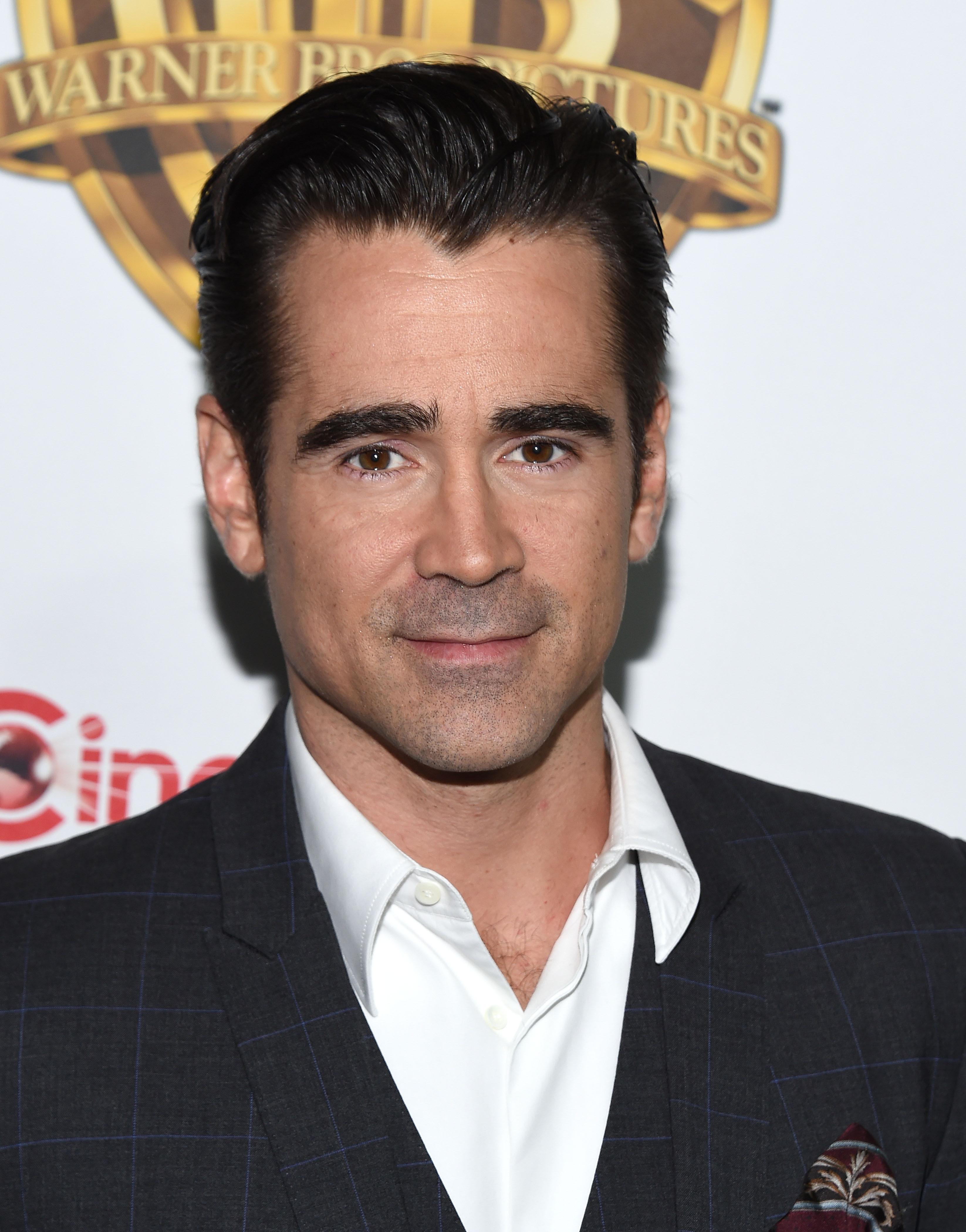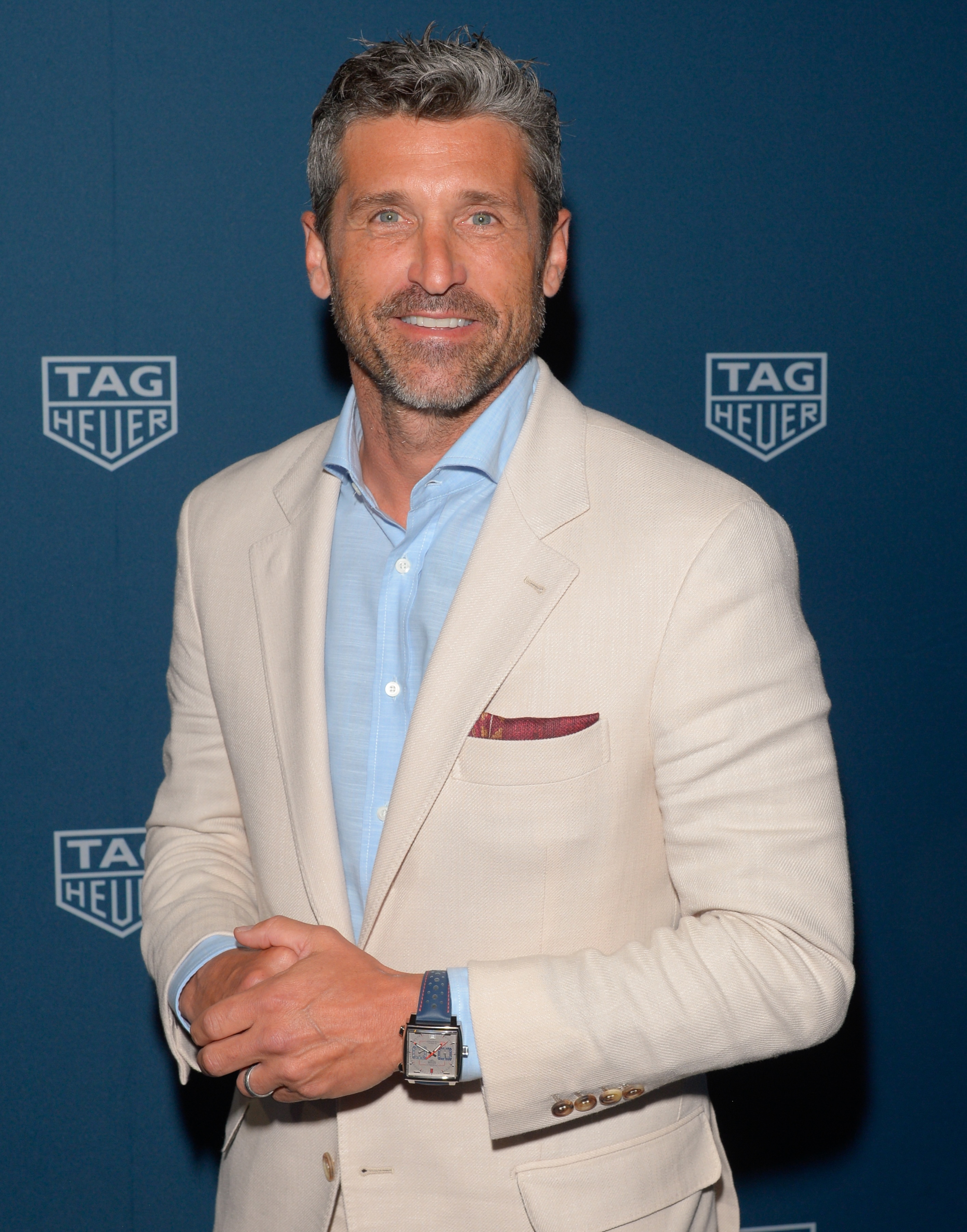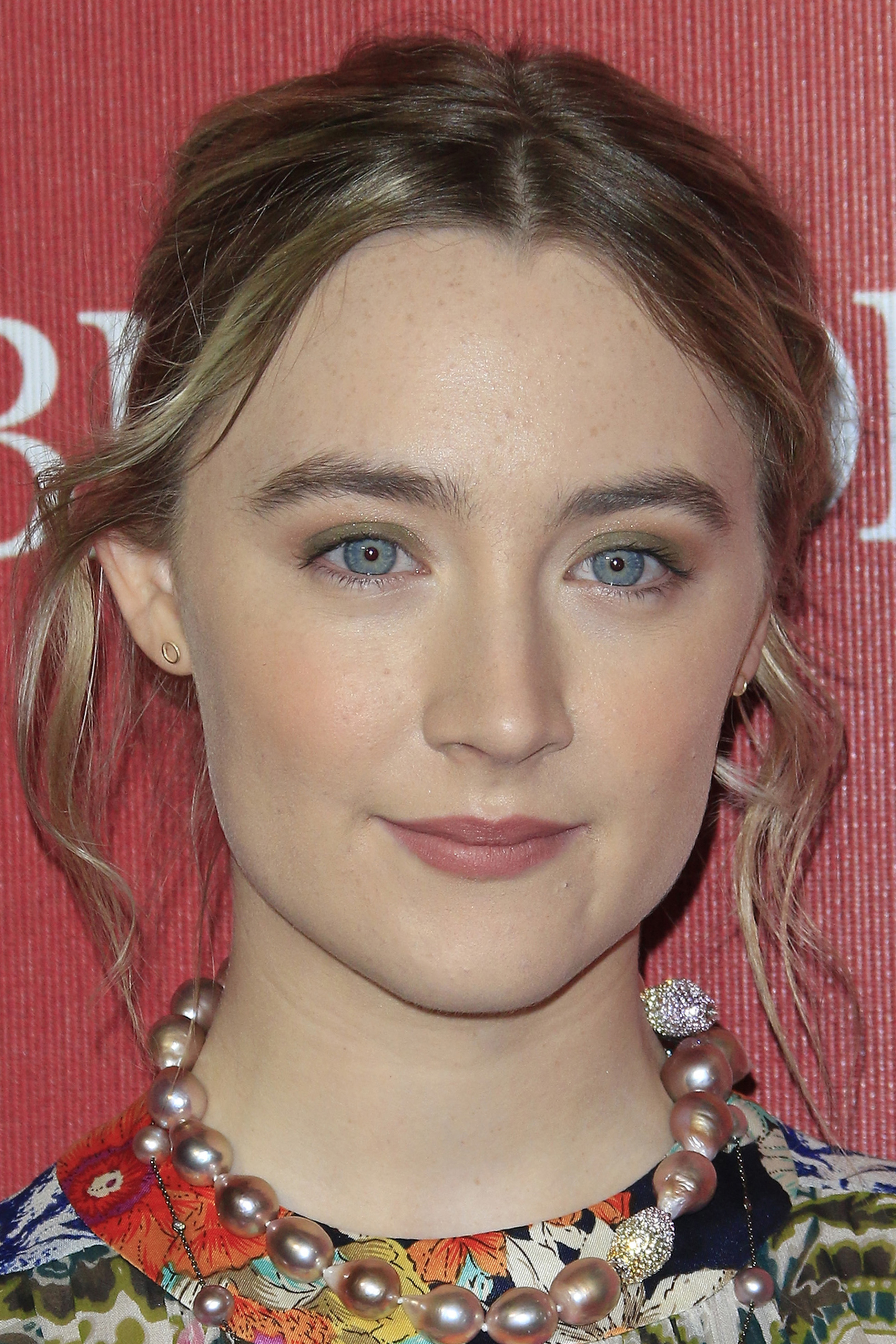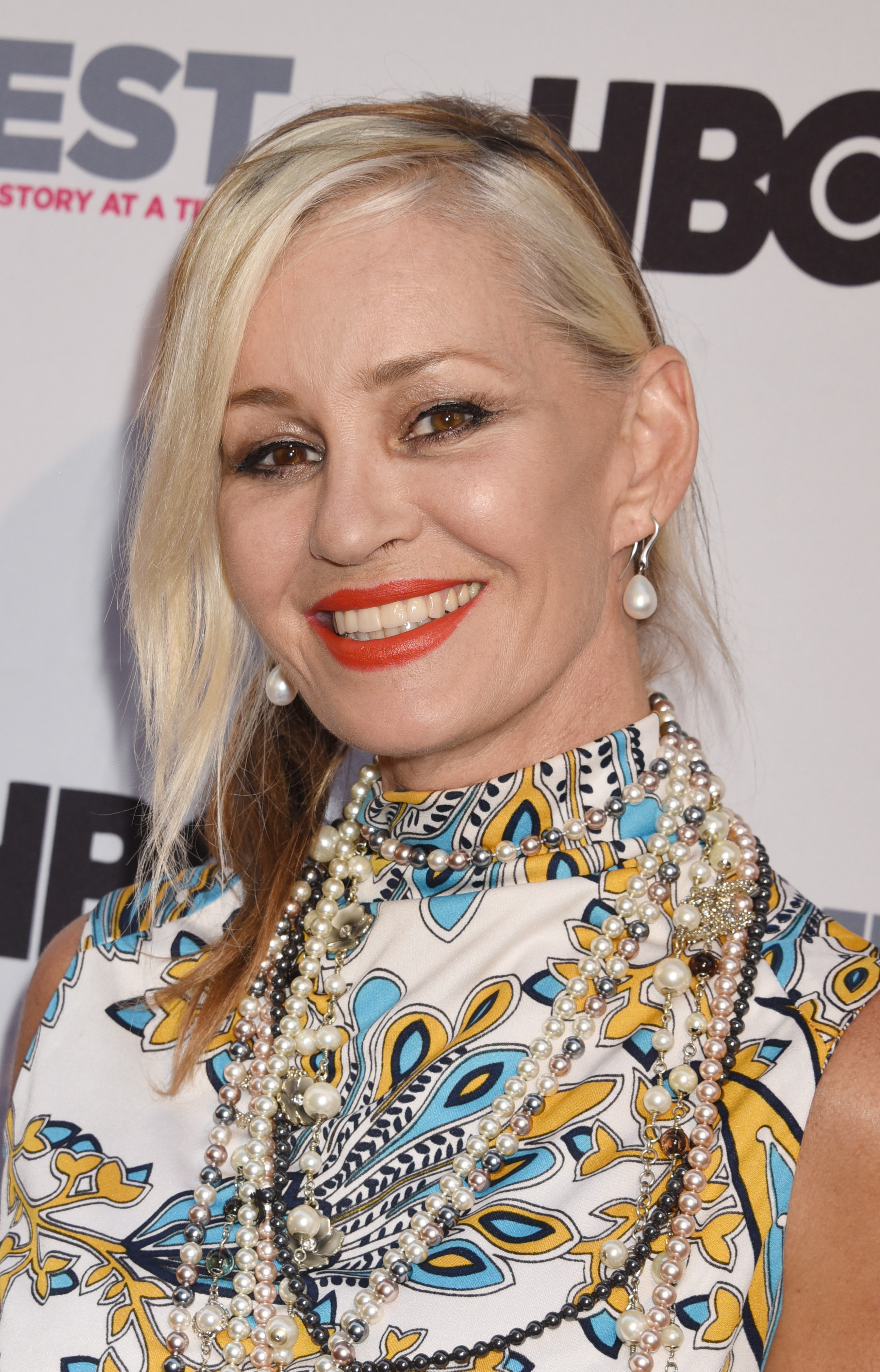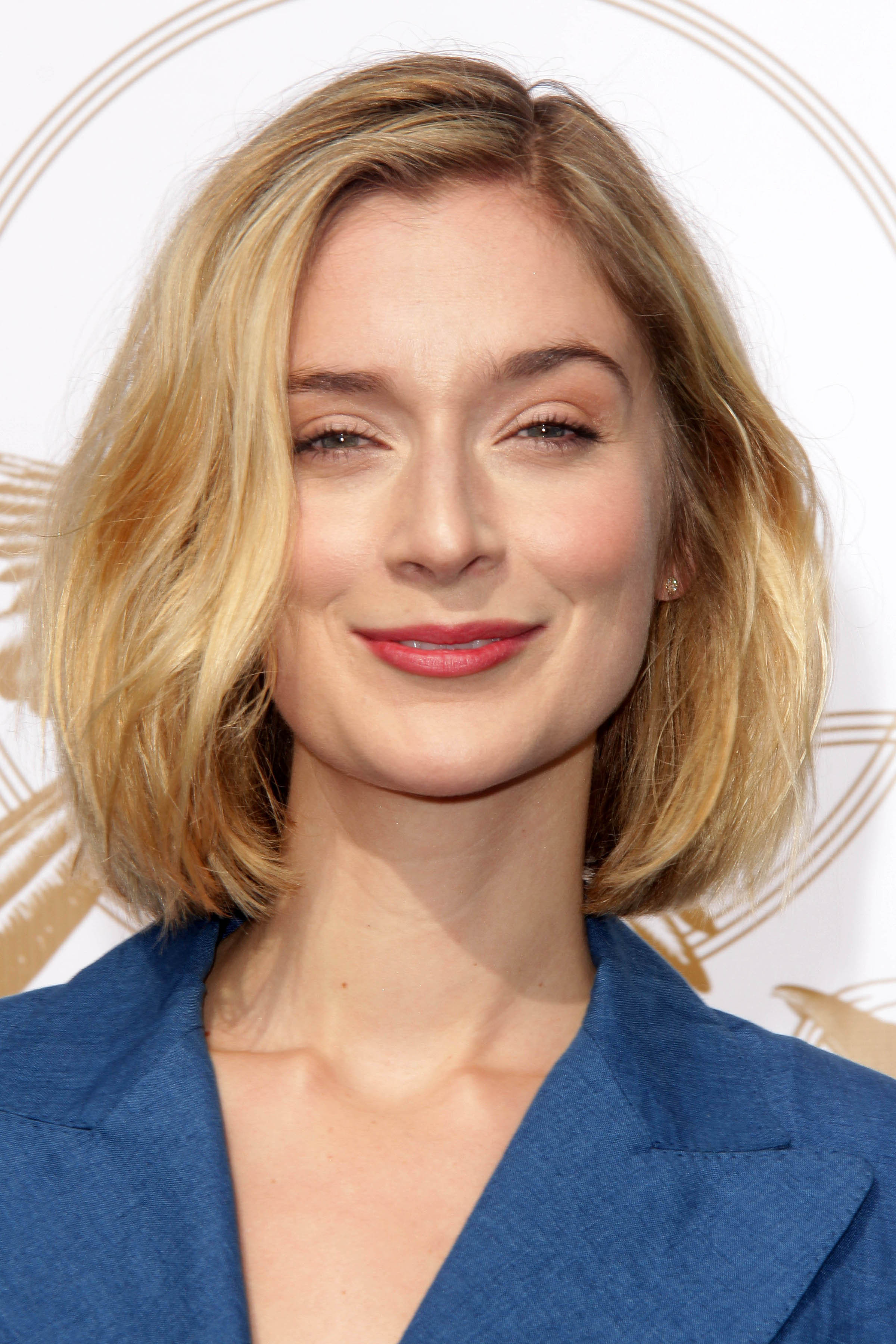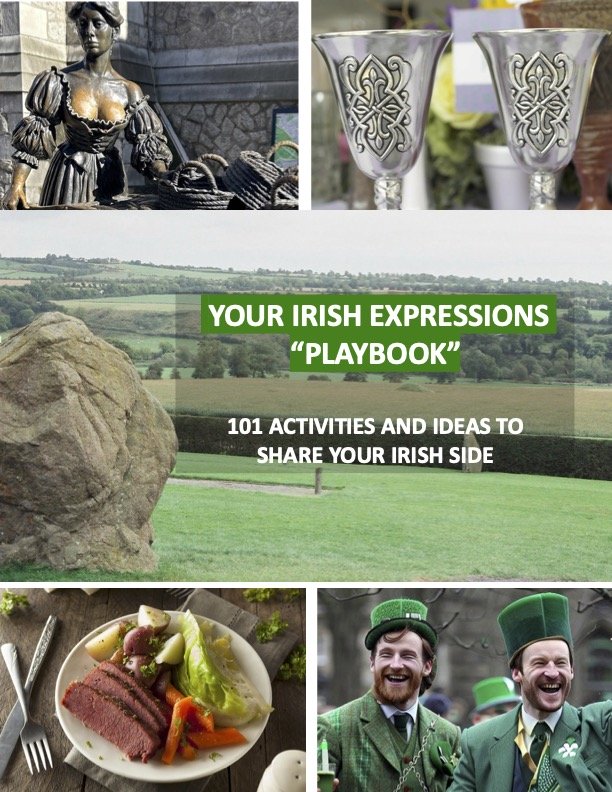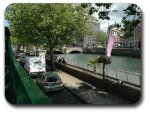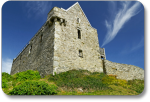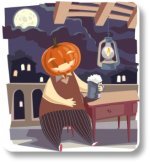- Home
- Trivia and Traditions
- Irish Names
Choosing an Irish Name: Get an Early Start Expressing Their Irish Side!
Choosing an Irish name may seem difficult at first. But once you know a few of them, you begin to recognize them - they are all around us! Many Irish names have very interesting meanings and historical significance, making them a particularly wonderful way to express our individual Irish sides.
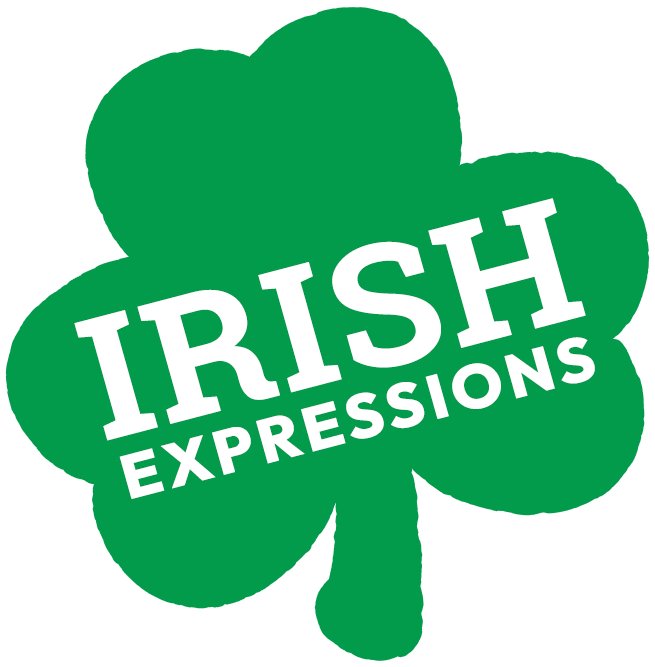
So ... How Well Do You Know Your Irish Stuff?
Tap HERE to find out!
I went through the process of choosing an Irish name when we named my third son Aiden. Derived from the name of a 7th century Irish bishop - Aodhan - it basically means "fire" or "fiery one," reflecting the qualities of passion and strength. A good choice on our part, if I do say so myself :-)
Anyway, I look forward to sharing some of our favorite names with you and providing links to many more. Sneak preview: we have lists of Irish names for baby boys and baby girls. They work equally well when choosing an Irish name for human babies and ... fur babies (pets :-). Shall we begin?
Choosing an Irish Name: How to Begin
One place to start when choosing an Irish name is to answer a few questions for yourself and your co-parent. What are the qualities you value and want to instill in your little one? What aspects of Irish culture or history do you want to honor and commemorate in your family history? Which Irish name sounds like it would be fun to say over and over again for many, many years? :-)
Please keep in mind - names often have very complex histories and a variety of different meanings. The information below is my best summary of what I have learned about choosing an Irish name, but I make no claim that they are all 100% correct (or even 100% Irish, although they all have ties to Ireland).
With that in mind, here are some ideas to get you started.
Choosing an Irish Name: For Baby Boy
Here are some of my favorite ideas when choosing an Irish name for baby boy:
Breandan
Pronunciation: BREN-dawn
Common Derivations: Brendan, Brandon
Meaning: "Prince" or "Little Raven"
Popular Example: Brendan Gleeson, Irish actor
Historical Figure: St. Brendan the Navigator
St. Brendan was one of the early Irish monastic saints who was renowned for his legendary voyage in search of the "Isle of the Blessed." Born in 484 AD, his daring journey across the Atlantic was chronicled in the "Navigatio Sancti Brendani," which described sights and adventures beyond the known world. His pursuit of mystical isles not only inspired fellow explorers but also contributed to the lore of pre-Columbian trans-oceanic contact myths.
Callahan
Pronunciation: KA-luh-han
Common Derivations: Calhoun, Gallahan
Meaning: "Bright-Headed"
Popular Example: Callahan Walsh, TV host and child safety advocate
Historical Figure: Callahan O'Rourke
Callahan O'Rourke was a chieftain in the province of Connacht during the late 10th century. He was known for his wisdom and strategic prowess, often successfully mediating conflicts between rival clans. His leadership played a crucial role during the Battle of Cath Arda, where his quick thinking facilitated victory against a formidable Norse threat.
Cian
Pronunciation: KEE-an
Common Derivations: Kean, Keane
Meaning: "Ancient" or "Enduring"
Popular Example: Cian Healy, Irish rugby player
Historical Figure: Cian mac Mael Muad
Cian was a notable figure in Irish mythology, hailed as the father of the legendary Lugh, a hero in Celtic myths. He was infamous for his tragic conflict with the sons of Tuireann, sparking tales of vengeance and quests for redemption. The mythological tales surrounding him emphasize the ancient Irish values of honor and kinship, excellent reasons for choosing an Irish name.
Colm
Pronunciation: COH-lum
Common Derivations: Colum, Collin
Meaning: "Dove"
Popular Example: Colm Meaney, Irish actor
Historical Figure: Colm Cille (St. Columba)
Colm Cille was a 6th-century abbot and missionary credited with spreading Christianity in Scotland. Founded the famous monastery of Iona, which became a pivotal center for learning and spirituality. His dedication and diplomacy were integral to maintaining peace among warring clans, earning him sainthood and reverence in both Ireland and Scotland.
Conor
Pronunciation: KUH-nur
Common Derivations: Connor, Conor
Meaning: "Lover of Hounds"
Popular Example: Connor McGregor, Irish mixed martial artist
Historical Figure: Conor mac Nessa
King Conor ruled the Ulaid, an ancient kingdom in northern Ireland, during the Ulster Cycle of Irish mythology. He was known for his charisma and martial prowess. His saga features fierce battles, legendary heroes, and tragic loves, reflecting the richness of Irish storytelling.
Daire
Pronunciation: DAW-reh
Common Derivations: Dara, Dáire
Meaning: "Fruitful" or "Fertile"Z
Popular Example: Dara O' Briain, Irish comedian
Historical Figure: Dáire Doimthech
Dáire was a mythological king of Ulster, often associated with wealth and prosperity due to the fertile lands of his kingdom. His cattle are central to the epic "Táin Bó Cúailnge," which recounts the famed cattle raids that define much of early Irish narrative history. His reign exemplifies the challenges and triumphs of ancient Irish kingship.
Eoin
Pronunciation: OH-in
Common Derivations: Owen, John
Meaning: "God is Gracious"
Popular Example: Eoin Morgan, Irish born cricketer
Historical Figure: Eoin MacNeill
An influential scholar and nationalist leader, Eoin MacNeill played a prominent role in the early 20th-century Irish independence movement. As a co-founder of the Gaelic League, he was pivotal in reviving the Irish language and culture. Even though his call to arms during the Easter Rising was marred by last-minute counterorders, his impact on Irish history remains significant.
Farrell
Pronunciation: FAR-el
Common Derivations: Ferrell, Fergal
Meaning: "Man of Valor"
Popular Example: Colin Farrell, Irish actor
Historical Figure: Fearghal mac Máele Dúin
Fearghal was a high king of Ireland in the 8th century. Renowned for his valor and leadership, he met a dramatic fate at the Battle of Allen. His rule encompassed struggles for sovereignty and unifying the fragmented Irish chieftains under his command.
Lorcan
Pronunciation: LOR-kawn
Common Derivations: Larkin, Lorran
Meaning: "Little Fierce One"
Popular Example: Lorcan Cranitch, Irish actor
Historical Figure: Lorcán Ua Tuathail (St. Laurence O’Toole)
A 12th-century archbishop of Dublin, Lorcán was noted for his diplomatic skills, managing relations between the Gaelic Irish and the newly arrived Anglo-Normans with deft grace. During his tenure, he championed peace and reform within the Irish church, ultimately canonized for his enduring faith and political acumen.
Niall
Pronunciation: NYE-al
Common Derivations: Neal, Neil
Meaning: "Champion"
Popular Example: Niall Horan, member of boy band One Direction
Historical Figure: Niall of the Nine Hostages
Niall was a legendary king who is often credited with bringing the legendary Scoti to Ireland. Famous for taking hostages from rival clans, his reign saw the consolidation of power and influence, setting the stage for the future High Kings of Tara. His lineage is said to have extended into historical Scottish and Irish dynasties.
Aodhan
Pronunciation: AY-dawn
Common Derivations: Aidan, Aiden
Meaning: "Little Fire"
Popular Example: Aidan Turner, Irish actor
Historical Figure: Aodhan mac Gabran
Aodhan ruled as King of Dalriada in the 6th century, a kingdom straddling modern-day Ireland and Scotland. His ambitions to unite the Picts and Scots were marked by bold, albeit volatile, campaigns. His legacy resonates in the subsequent unification of Scottish territories (and in my own experience, when choosing an Irish name for my son).
Cillian
Pronunciation: KILL-ee-an
Common Derivations: Killian, Kilian
Meaning: "Church"
Popular Example: Cillian Murphy, Irish Actor
Historical Figure: St. Cillian
St. Cillian was an Irish missionary bishop, leading efforts to Christianize parts of Franconia in the 7th century. His passion for spreading Christian tenets led to his martyrdom. Celebrated on the 8th of July, St. Kilian's Day is remembered for his enduring zeal and faith.
Eoghan
Pronunciation: OH-in
Common Derivations: Ewan, Owen
Meaning: "Born of the Yew Tree"
Popular Example: Ewan McGregor, Scottish actor
Historical Figure: Eoghan Ó Néill
Eoghan, a formidable Gaelic lord, played a pivotal role during the Elizabethan conquest in the late 16th century. He sought to preserve Gaelic lordship, forging critical alliances. His strategic acumen underpinned several key military victories against the English forces.
Fergal
Pronunciation: FER-gal
Common Derivations: Fergus, Fergie
Meaning: "Brave Man"
Popular Example: Fergal Sharkley, Irish singer
Historical Figure: Fergal mac Máele Dúin
High King of Ireland, Fergal's legacy is enshrined in his martial valor and ambition. His reign, marked by conquests, ended heroically at the infamous Battle of Allen. Celebrated in folklore, his courage still inspires.
Keegan
Pronunciation: KEE-gan
Common Derivations: Kegan, Keagan
Meaning: "Son of Egan"
Popular Example: Kegan Michael Key, American actor
Historical Figure: Keegan O’Toole
Twentieth-century poet Keegan O'Toole became celebrated for his profound exploration of Irish identity. His evocative works brought rural Ireland's charm and struggles to a global audience, enhancing appreciation for Irish culture, and ensuring that Keegan would be a frequent option when choosing an Irish baby boy name.
Malachy
Pronunciation: MAL-a-kee
Common Derivations: Malachi, Malachie
Meaning: "Messenger of God"
Popular Example: Malachi Kirby, British actor
Historical Figure: St. Malachy
12th-century Archbishop Malachy was renowned for his visions and Church reforms. His prophetic declarations, including predictions about papal succession, remain subjects of fascination. Canonized by Pope Clement III, he's venerated as a notable Irish patron saint.
Naoise
Pronunciation: NEE-sha
Common Derivations: Neesha, Nee-shay
Meaning: "Warrior"
Popular Example: Naoise Dolan, Irish author
Historical Figure: Naoise mac Usnech
Central to the saga "Deirdre of the Sorrows," Naoise embodies tragic love and heroism. His story with Deirdre reflects the intricate dance of fate and emotion. Their legend captures the poignant intensity of ancient Irish storytelling.
Oisin
Pronunciation: UH-sheen
Common Derivations: Ossian, Osheen
Meaning: "Little Deer"
Popular Example: Oisin Tymon, British TV producer
Historical Figure: Oisín son of Fionn
A bard and warrior, Oisín, son of Fionn Mac Cumhaill, stands at the heart of Fenian Cycle mythology. His epic love for Niamh of the Golden Hair symbolizes transcendent ties between mortal and mystical realms. Their sojourns to Tir na nOg, the Land of Youth, highlight timeless themes of love and longing.
Padraig
Pronunciation: PAW-rick
Common Derivations: Patrick, Paddy
Meaning: "Nobleman"
Popular Example: Patrick Dempsey, American actor
Historical Figure: St. Patrick
Ireland's foremost patron saint, St. Patrick was instrumental in establishing Christianity across the island in the 5th century. Renowned for his metaphoric use of the shamrock to explain the Holy Trinity. His legacy is fervently celebrated worldwide on March 17th.
Ronan
Pronunciation: ROH-nawn
Common Derivations: Ronin, Rohnan
Meaning: "Little Seal"
Popular Example: Ronan Keating, Irish singer
Historical Figure: Ronan Finn
Though less known than mythical peers, Ronan tactical exploits in the 13th-century annals against external raids exemplify tenacity. His prowess in ferocious battles against Viking incursions has become a quintessential tale of regional folklore. Ronan's places in the pantheon of legendary warriors augment the timeless spirit of Ireland.
Sean
Pronunciation: SHAWN
Common Derivations: Shaun, Shane
Meaning: "God is Gracious"
Popular Example: Sean Penn, American actor
Historical Figure: Sean O’Casey
As a pivotal 20th-century playwright, Sean O'Casey vividly depicted Dublin's working-class life. His works, addressing political upheaval, are heralded for authentic representations and innovative narratives. Despite controversy, his contributions galvanized dramatic arts in Ireland.
Tadhg
Pronunciation: TIE-g
Common Derivations: Teague, Tiger
Meaning: "Poet"
Popular Example: Tadhg Furlong, Irish ruby player
Historical Figure: Tadhg Dall Ó Huiginn
An eminent bard of the 16th century, Tadhg Dall Ó Huiginn, thrived on classical Gaelic poetry. His verses deftly interwove history and myth, adding rich layers to cultural tapestry. Revered at the Gaelic courts, his legacy pervades traditional Irish literature.
Ultan
Pronunciation: UL-thawn
Common Derivations: Ulick, Ulltan
Meaning: "Of the Ulstermen"
Popular Example: Ultan Conlon, Irish singer-songwriter
Historical Figure: St. Ultan of Ardbraccan
St. Ultan flourished in the 7th century, known for contributions to religious education and charity. His famed orphanage offered sanctuary amid societal upheaval. Deeply respected, he's remembered for nurturing future clergy and compassion in teaching.
Daithi
Pronunciation: DAH-hee
Common Derivations: Davey, David
Meaning: "Beloved"
Popular Example; Daithi O Se, Irish television presenter
Historical Figure: Daithi, Last Pagan King of Ireland
Daithi's reign during the 5th century signaled the end of Ireland's pagan history. Known for resisting emerging Christianity, his demise at the Battle of Tara allowed a new epoch's dawn. His storied campaigns solidified his legacy among legendary Irish figures.
Fearghus
Pronunciation: FER-gus
Common Derivations: Fergus, Ferris
Meaning: "Man of Strength"
Popular Example: Fergus Henderson, British chef
Historical Figure: Fearghus mac Roich
An embodiment of vitality in Ulster Cycle myths, Fearghus was a mighty warrior and noble chieftain. His tales of conflict and camaraderie with heroic Connacht warriors paint a vibrant picture of courage and loyalty. His eminent role underscores the intricate weave of myth and reality in Celtic heritage.
Choosing an Irish Name: For Baby Girl
Here are some of my favorite ideas when choosing an Irish name for baby girl:
Aoife
Pronunciation: EE-fa
Common Derivations: Eva, Eve
Meaning: "Beautiful, radiant, joyful"
Popular Example: Aoife McArdle, Irish film director
Historical Figure: Aoife, Daughter of Dermot of Leinster
Aoife was a noblewoman involved in significant historical events during the 12th century. Known for her intelligence and strategic alliances, she became a key figure in the Norman invasion of Ireland, marrying Richard de Clare, also known as Strongbow. Her legacy endures in the many stories of her life and influence.
Saoirse
Pronunciation: SEER-sha
Common Derivations: Seersha, Sorcha
Meaning: "Freedom"
Popular Example: Saoirse Ronan, Irish-American actress
Historical Figure: Saoirse St. John
Saoirse St. John was a significant peace activist in the 20th century who played a crucial role in various human rights movements throughout Ireland. Her work in advocating for freedom and equality placed her at the forefront of social change during tumultuous times.
Ciara
Pronunciation: KEE-ra
Common Derivations: Keira, Kiera
Meaning: "Dark or black-haired"
Popular Example: Ciara Smyth, Irish author
Historical Figure: Saint Ciara of Kilkeary
Saint Ciara of Kilkeary was noted for her religious devotion and leadership during the 7th century. She founded a monastery in Tipperary, remembered for her piety and commitment to her faith, leaving a lasting impact on the region.
Niamh
Pronunciation: NEE-av, NEEV
Common Derivations: Neve, Neave
Meaning: "Bright or radiant"
Popular Example: Niamh Cusack, Irish actress
Historical Figure: Niamh of the Golden Hair
In Irish mythology, Niamh of the Golden Hair was a goddess known for her beauty and love for the hero Oisín. Her story, marked by themes of adventure and eternal love, captures the imagination and highlights the enchantment of the Otherworld.
Roisin
Pronunciation: ROH-sheen
Common Derivations: Rosaleen, Roisin
Meaning: "Little rose"
Popular Example: Róisín Murphy, Irish singer-songwriter
Historical Figure: Róisín Dubh
Róisín Dubh is a symbolic figure in Irish cultural history, often referenced in an allegorical context as Ireland itself. The name is linked to a traditional song that expresses Ireland's struggles and aspirations, embodying the spirit and resilience of the Irish people throughout history.
Orla
Pronunciation: OR-la
Common Derivations: Orlagh, Orlaith
Meaning: "Golden princess"
Popular Example: Orla Brady, Irish actress
Historical Figure: Orlaith Ingen Ceallach
Orlaith Ingen Ceallach was a revered abbess in the 10th century known for her influential role in the church. Her leadership and spiritual guidance made her a significant figure in early medieval Ireland.
Caoimhe
Pronunciation: KWEE-vah, KEE-vah
Common Derivations: Keeva, Kiva
Meaning: "Gentle or beautiful"
Popular Example: Caoimhe Guilfoyle, Irish poet
Historical Figure: Caoimhe Mac Duibh
Caoimhe Mac Duibh was known in medieval Ireland for her contributions to poetry and storytelling, capturing the gentle essence and beauty of Gaelic culture. As a revered bard, her works were celebrated for their reflection of the Irish spirit.
Siobhan
Pronunciation: shiv-AWN
Common Derivations: Siobhan, Shavonne
Meaning: "God is gracious"
Popular Example: Siobhán Fahey, Singer / Songwriter
Historical Figure: Siobhán O'Hanlon
Siobhán O'Hanlon was a notable figure in Irish political history, particularly recognized for her role in peace negotiations and her efforts to promote community development and reconciliation. Her life’s work significantly impacted modern Irish society.
Fionnuala
Pronunciation: fin-OO-la
Common Derivations: Finola, Nuala
Meaning: "Fair shoulders"
Popular Example: Fionnuala Sweeney, Irish journalist
Historical Figure: Fionnuala, Daughter of Lir
Fionnuala is a key character in the Irish legend of the Children of Lir, transformed into a swan by her stepmother’s curse. Her story is one of beauty, resilience, and eternal love, echoing throughout Irish folklore.
Grainne
Pronunciation: GRAWN-ya
Common Derivations: Grania, Granya
Meaning: "Grain and fertility"
Popular Example: Gráinne Seoige, Irish broadcaster
Historical Figure: Gráinne Mhaol
Gráinne Mhaol, also known as Grace O'Malley, was a formidable chieftain and pirate queen during the 16th century. Her leadership and defiance against English rule have immortalized her as an iconic figure of Irish resistance and power.
Clodagh
Pronunciation: KLO-da
Common Derivations: Cloda, Clodagh
Named After: The river Clodagh in Tipperary
Popular Example: Clodagh McKenna, Irish chef and author
Historical Figure: Clodagh O'Higgins
Clodagh O'Higgins was a prominent botanist in the 19th century whose studies along the River Clodagh contributed significantly to the understanding of Ireland's regional flora. Her dedication to environmental conservation earned her recognition among naturalists.
Maeve
Pronunciation: MAYV
Common Derivations: Mave, Maedbh
Meaning: "She who intoxicates"
Popular Example: Maeve Binchy, Irish author
Historical Figure: Queen Maeve of Connacht
Queen Maeve is a legendary figure from Irish folklore, known for her beauty, ambition, and commanding presence. Her story is central to the epic saga "The Cattle Raid of Cooley," signifying strength and empowerment, excellent reasons for choosing an Irish name like Maeve.
Aisling
Pronunciation: ASH-ling
Common Derivations: Ashlene, Aislinn
Meaning: "Vision or dream"
Popular Example: Aisling Bea, Irish comedian
Historical Figure: Aisling Kearney
Aisling Kearney was a visionary educator in early 20th-century Ireland who advocated for progressive educational reforms. Her dreams for a more inclusive and forward-thinking educational system left a lasting legacy in the Irish academic landscape.
Sadhbh
Pronunciation: SIVE, SIGH-v
Common Derivations: Sive, Siveen
Meaning: "Sweet or goodness"
Popular Example: Sadhbh Devlin, Irish children's author
Historical Figure: Sadhbh, from Fenian Cycle
In the Fenian Cycle of Irish mythology, Sadhbh was a gentle woman caught in enchantment and conflict. Her tale reflects themes of love and adversity, enriching her name with depth and resonance.
Caitlin
Pronunciation: KATH-leen, KOT-leen
Common Derivations: Catlin, Kathleen
Derived From: Catherine
Popular Example: Caitlin Fitzgerald, American Actress
Historical Figure: Caitlín Bean Uí Chléirigh
Caitlín Bean Uí Chléirigh was a distinguished figure in the 17th century who played an influential role in preserving Irish history and culture during turbulent times. She was the wife of Mícheál Ó Cléirigh, one of the authors of the "Annals of the Four Masters," and supported the compilation of this vital historical manuscript that chronicled the history of Ireland.
Eadaion
Pronunciation: AY-deen
Common Derivations: Aideen, Aedin
Meaning: "Jealousy or fire"
Popular Example: Eadaoin O’Neill, Irish violinist
Historical Figure: Éadaoin from Irish Mythology
Éadaoin is a central character in romantic and tragic tales within Irish mythology. Her stories, laden with themes of longing and transformation, contribute a mythical allure to her name, reflecting the intensity of emotions.
Blathnaid
Pronunciation: BLAW-nid
Common Derivations: Blanaid, Blathna
Meaning: "Flower"
Popular Example: Bláthnaid Treacy, Irish television and radio presenter
Historical Figure: Blathnaid from mythological tales
Blathnaid emerges from Irish mythology as a figure representing beauty and betrayal. Her tale underscores the delicate yet powerful nature of women in folklore, much like her name suggests the fragile elegance of a flower.
Muirgen
Pronunciation: MUR-gen
Common Derivations: Morgan, Morrigan
Meaning: "Born of the sea"
Popular Example: Muirgen O'Mahony, Irish medical researcher
Historical Figure: Muirgen O'Sullivan
Muirgen O'Sullivan was a well-known maritime explorer in the late 18th century, celebrated for her detailed mapping and exploration of the Irish coastline. Her contributions expanded the geographical understanding of Ireland's marine boundaries.
Deirdre
Pronunciation: DEER-dra
Common Derivations: Deidre, Deedra
Meaning: "Sorrowful"
Popular Example: Deirdre O'Kane, Irish comedian
Historical Figure: Deirdre of the Sorrows
Deirdre of the Sorrows is a poignant figure in Irish legend, illustrating themes of beauty and tragedy. Her story of love and sadness profoundly impacts Irish cultural narratives, making the name timeless.
Ailbhe
Pronunciation: AL-va
Common Derivations: Alva, Alby
Meaning: "Noble"
Popular Example: Ailbhe Reddy, Irish singer-songwriter
Historical Figure: Saint Ailbhe
Saint Ailbhe was a revered figure in early Irish Christianity, known for his noble deeds and leadership. The name carries a heritage of spiritual significance and moral integrity.
Eimear
Pronunciation: EE-mer
Common Derivations: Emer, Eamara
Meaning: "Swift"
Popular Example: Eimear Quinn, Irish singer
Historical Figure: Eimear of legend
Eimear, the wife of the legendary hero Cú Chulainn, stands as a symbol of intellect and beauty. Her keen wisdom is celebrated in Irish stories, exhibiting both mental and emotional strength.
Mairead
Pronunciation: mur-AID
Common Derivations: Maire, Margaret
Derived From: Margaret
Popular Example: Mairead McGuinness, Irish politician
Historical Figure: Mairead Corrigan
Mairead Corrigan is a co-founder of the Peace People, an organization dedicated to promoting peaceful resolutions and reconciliation in Northern Ireland. Her tireless work in the 1970s earned her the Nobel Peace Prize, highlighting her significant impact on peace-building efforts.
Muireann
Pronunciation: MWER-an
Common Derivations: Murrin, Moiran
Meaning: "Sea white or sea fair"
Popular Example: Muireann Nic Amhlaoibh, Irish singer
Historical Figure: Muireann from mythological traditions
Muireann carries a mystical air, often linked with marine mythology and folklore. Though not associated with a singular historical figure, the name conjures images of the sea's power and allure.
Riona
Pronunciation: REE-uh-na
Common Derivations: Riona, Rioghna
Meaning: "Queenly"
Popular Example: Ríona Ní Fhrighil, Irish academic
Historical Figure: Ríona Flynn
Ríona Flynn was a celebrated patron of the arts in the late 19th century. Known for her support of local artists and the revival of Irish literature, she played a key role in sparking the Celtic Revival, a movement that sought to revive the cultural history of Ireland.
Aobh
Pronunciation: Eve
Common Derivations: Aoife, Eva
Meaning: "Beauty"
Popular Example: Aoibhéann McCann, Irish actress
Historical Figure: Aobh from Irish legend
Aobh is celebrated in Irish legends notably as a symbol of beauty and allure. Though not connected to a historical entity, this name reflects the storied richness and aesthetic admiration found in Irish tradition.
For more information on choosing an Irish name, have a look at The Bump, one of our favorite online sources for baby stuff in general!
Want More Irish Traditions?
It is probably obvious - at Irish Expressions, we love Irish traditions! Expressing ourselves through Irish-themed activities gives us a deeper sense of connection with Ireland, wherever in the world we happen to be!
Over the years, we have created many downloadable, share-able Irish games, puzzles, recipes, songbooks, quizzes, and much, much more.
Want them right now? Keep reading to learn about "Your Irish Expressions Playbook."
More Fun With Irish Expressions
Congratulations on learning more about the Emerald Isle and discovering what we like to call your "Irish Side." You may be thinking "I'd love to actually VISIT Ireland but that's really not in the cards right now. What am I supposed to do with the stuff I just learned?"
Well never fear! Since 2009 we have collected all of the best printable, shareable resources we could find, to help you put your new knowledge of Ireland to good use. We've put them all together in a single download we call "Your Irish Expressions Playbook," which contains over 100 pages of games, puzzles, recipes, songbooks, quizzes, travel guides and much, much more.
Purchase them ALL for one small price, print as many copies as you like and share them with your friends - with no limitations! But order soon - we are already adding to the Playbook for future editions and this price will not last long.
Oh, want one more reason to order right away? If you buy YOUR copy of the Playbook now, you will be allowed to upgrade to any new future edition for FREE.
ORDER YOUR IRISH EXPRESSIONS PLAYBOOK HERE

Please Share Your Feedback
Did we miss anything? Is there a topic you would like us to cover in the future? Tap HERE to let us know!
